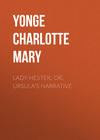Читать книгу: «That Stick», страница 5
CHAPTER XI
POSSESSION
So Francis Morton, Baron Northmoor of Northmoor, and Mary Marshall, daughter of the late Reverend John Marshall, were man and wife at last. Their honeymoon was ideally happy. It fulfilled a dream of their life, when Frank used, in the holidays spent by Mary with his mother, to read aloud the Waverley novels, and they had calculated, almost as an impossible castle in the air, the possibility of visiting the localities. And now they went, as assuredly they had never thought of going, and not much impeded by the greatness that had been thrust on them. The good-natured Kentons had dispensed his Lordship from the encumbrance of a valet, and though my Lady could not well be allowed to go maidless, Lady Kenton had found a sensible, friendly person for her, of whom she soon ceased to be afraid, and thus felt the advantage of being able to attend to her husband instead of her luggage.
Tourists might look and laugh at their simple delight as at that of a pair of unsophisticated cockneys. This did not trouble them, as they trod what was to them classic ground, tried in vain the impossible feat of ‘seeing Melrose aright,’ but revelled in what they did see, stood with bated breath at Dryburgh by the Minstrel’s tomb, and tracked his magic spells from the Tweed even to Staffa, feeling the full delight for the first time of mountain, sea, and loch. Their enjoyment was perhaps even greater than that of boy and girl, for it was the reaction of chastened lives and hearts ‘at leisure from themselves,’ nor were spirit and vigour too much spent for enterprise.
They tasted to the full every innocent charm that came in their way, and, above all, the bliss of being together in the perfect sympathy that had been the growth of so many years. Their maid, Harte, might well confide to her congeners that though my lord and my lady were the oldest couple she had known, they were the most attached, in a quiet way.
They were loth to end this state of felicity before taking their new cares upon them, and were glad that the arrangements of the executors made it desirable that they should not take possession till October, when they left behind them the gorgeous autumn beauty of the western coast and journeyed southwards.
The bells were rung, the gates thrown wide open, and lights flashed in the windows as Lord and Lady Northmoor drove up to their home, but it was in the dark, and there was no demonstrative welcome, the indoor servants were all new, the cook-housekeeper hired by Lady Kenton’s assistance, and the rest of the maids chosen by her, the butler and his subordinate acquired in like manner.
It was a little dreary. The rooms looked large and empty. Miss Morton’s belongings had been just what gave a homelike air to the place, and when these were gone, even the big fires could not greatly cheer the huge spaces. However, these two months had accustomed the new arrivals to their titles, and likewise to being waited upon, and they were less at a loss than they would have been previously, though to Mary especially it was hard to realise that it was her own house, and that she need ask no one’s leave. Also that it was not a duty to sit with a fire. She could not well have done so, considering how many were doing their best to enliven the house, and finally she spent the evening in the library, not a very inviting room in itself, but which the late lord had inhabited, and where the present one had already held business interviews. It was, of course, lined with the standard books of the last generation, and Mary, who had heard of many, but never had access to them, flitted over them while her husband opened the letters he had found awaiting him. To her, what some one has called the ‘tea, tobacco, and snuff’ of an old library where the books are chiefly viewed as appropriate furniture, were all delightful discoveries. Even to ‘Hume’s History of England—nine volumes! I did not know it was so long! Our first class had the Student’s Hume. Is there much difference?’
‘Rather to the Student’s advantage, I believe. Half these letters, at least, are mere solicitations for custom! And advertisements!’
‘How the books stick together! I wonder when they were opened last!’
‘Never, I suspect,’ said he. ‘I do not imagine the Mortons were much disposed to read.’
‘Well, they have left us a delightful store! What’s this? Smollett’s Don Quixote. I always wanted to know about that. Is it not something about giants and windmills? Have you read it?’
‘I once read an odd volume. He was half mad, and too good for this world, and thought he was living in a romance. I will read you some bits. You would not like it all.’
‘Oh, I do hope you will have time to read to me! Gibbon’s Decline and Fall of the Roman Empire. All these volumes! They are quite damp. You have read it?’
‘Yes, and I wish I could remember all those Emperors. I must put aside this letter for Hailes—it is a man applying for a house.’
‘How strange it sounds! Look, here is such an immense Shakespeare! Oh! full of engravings,’ as she fell upon Boydell’s Shakespeare—another name reverenced, though she only knew a few selected plays, prepared for elocution exercises.
Her husband, having had access to the Institute Library, and spent many evenings over books, was better read than she, whose knowledge went no farther than that of the highest class, but who knew all very accurately that she did know, and was intelligent enough to find in those shelves a delightful promise of pasture. He was by this time sighing over requests for subscriptions.
‘Such numbers! Such good purposes! But how can I give?’
‘Cannot you give at least a guinea?’ asked Mary, after hearing some.
‘I do not know whether in this position a small sum in the list is not more disadvantageous than nothing at all. Besides, I know nothing of the real merits. I must ask Hailes. Ah! and here is Emma, I thought that she would be a little impatient. She says she shall let her house for the winter, and thinks of going to London or to Brighton, where she may have masters for the girls.’
‘Oh, I thought you meant them to go to a good school?’
‘So I do, if I can get Emma’s consent; but I doubt her choosing to part with Ida. She wants to come here.’
‘I suppose we ought to have her?’
‘Yes, but not immediately. I do not mean to neglect her—at least, I do hope to do all that is right; but I think you ought to have a fair start here before she comes, so that we will invite her for Christmas, and then we can arrange about Ida and Constance.’
‘Dear little Connie, I hope she is as nice a little girl as she used to be!’
‘With good training, I think, she will be; and the tutor gives me good accounts of Herbert in this letter.’
‘Shall we have him here on Sunday week?’
‘Yes, I am very anxious to see him. I hope his master gives him more religious instruction than he has ever had, poor boy!’
Though not brilliant or playful, Lord and Lady Northmoor had, it may be perceived, no lack of good sense in their strange new surroundings. It was hard not to feel like guests on sufferance, and next morning, a Sunday, was wet. However, under their waterproofs and umbrellas trudging along, they felt once more, as Mary said, like themselves, as if they had escaped from their keepers. Nobody on the way had the least idea who the two cloaked figures were, and when they crept into the seat nearest the door they were summarily ejected by a fat, red-faced man, who growled audibly, ‘You’ve no business in my pew!’
However, with the words, ‘Beg your pardon,’ they stepped out with a little amusement in their eyes, when a spruce young woman sprang up from the opposite pew, with a scandalised whisper—
‘Mr. Ruddiman, it’s his Lordship! Allow me, my Lord—your own seat—’
And she marshalled them up to the choir followed closely by Mr. Ruddiman, ruddier than ever, and butcher all over, in a perfect agony of apology, which Lord Northmoor in vain endeavoured to suppress or silence, till, when the guide had pointed to a handsome heavy carved seat with elaborate cushions, he gave a final gasp of, ‘You’ll not remember it in the custom, my Lord,’ and departed, leaving his Lordship almost equally scarlet with annoyance at the place and time of the demonstration, though, happily, the clergyman had not yet appeared, in his long and much-tumbled surplice.
It was a case of a partial restoration of a church in the dawn of such doings, when the horsebox was removed, but the great family could not be routed out of the chancel, so there were the seats, where the choir ought to have sat, beneath a very ugly east window, bedecked with the Morton arms. In the other division of the seat was a pale lady in black, with a little girl, Lady Adela Morton, no doubt, and opposite were the servants, and the school children sat crowded on the steps. It was not such a service as had been the custom of the Hurminster churches; and the singing, such as it was, depended on the thin shrill voices of the children, assisted by Lady Adela and the mistress; the sermon was dull and long, and altogether there was something disheartening about the whole.
Lady Adela had a gentle, sweet countenance and a simple devout manner; but it was disappointing that she did not attempt to address the newcomers, though they passed her just outside the churchyard, talking to an old man. Lady Kenton would surely have welcomed them.
CHAPTER XII
THE BURTHEN OF HONOURS
A fearful affair to the new possessors of Northmoor was the matter of morning calls. The first that befell them, as in duty bound, was that from the Vicar. They were peaceably writing their letters in the library, and hoping soon to go out to explore the Park, when Mr. Woodman was announced, and was found a lonely black speck in the big dreary drawing-room, a very state room, indeed, which nobody had ever willingly inhabited. The Vicar was accustomed to be overridden; he was an elderly widower, left solitary in his old age, and of depressed spirits and manner. However, Frank had been used to intercourse with clergy, though his relations with them seemed reversed, and instead of being patronised, he had to take the initiative; or rather, they touched each other’s cold, shy, limp hands, and sat upright in their chairs, and observed upon the appropriate topic of early frosts, which really seemed to be affecting themselves.
There was a little thaw when Lord Northmoor asked about the population, larger, alas, than the congregation might have seemed to show, and Mary asked if there were much poverty, and was answered that there was much suffering in the winter, there was not much done for the poor except by Lady Adela.
‘You must tell us how we can assist in any way.’
The poor man began to brighten. ‘It will be a great comfort to have some interest in the welfare of the parish taken here, my Lord. The influence hitherto has not been fortunate. Miss Morton, indeed—latterly—but, poor thing, if I may be allowed to say so, she is flighty—and uncertain—no wonder—’
At that moment Lady Adela was ushered in, and the Vicar looked as if caught in talking treason, while a fresh nip of frost descended on the party.
Not that the lady was by any means on stiff terms with the Vicar, whom, indeed, she daily consulted on parochial subjects, and she had the gracious, hereditary courtesy of high breeding; but she always averred that this same drawing-room chilled her, and she was fully persuaded that any advance towards familiarity would lead to something obnoxious on the part of the newcomers, so that the proper relations between herself and them could only be preserved by a judicious entrenchment of courtesy. Still, it was more the manner of the Vicar than of herself that gave the impression of her being a formidable autocrat. After the frost had been again languidly discussed, Mr. Woodman faltered out, ‘His Lordship was asking—was so good as to ask—how to assist in the parish.’
Lady Adela knew how scarce money must be, so she hesitated to mention subscriptions, and only said, ‘Thank you—very kind.’
‘Is there any one I could read to?’ ventured Mary.
‘Have you been used to the kind of thing?’ asked Lady Adela, not unkindly, but in a doubting tone.
‘No, I never could before; but I do wish to try to do something.’
The earnest humility of the tone was touching, the Vicar and the autocrat looked at one another, and the former suggested, ‘Old Swan!’
‘Yes,’ said Lady Adela, ‘old Swan lives out at Linghill, which is not above half a mile from this house, but too far off for me to visit constantly. I shall be very much obliged if you can undertake the cottages there.’
‘Thank you,’ said Mary, as heartily as if she were receiving a commission from the Bishop of the diocese.
‘Did not Miss Morton mention something about a boys’ class?’ said Frank. ‘I have been accustomed to a Sunday school.’
Mr. Woodman betrayed as much surprise as if he had said he was accustomed to a coal mine; and Lady Adela observed graciously, ‘Most of them have gone into service this Michaelmas; but no doubt it will be a relief to Mr. Woodman if you find time to undertake them.’
This was the gist of the first two morning calls, and there were many more such periods of penance, for the bride and bridegroom were not modern enough in their notions to sit up to await their visitors, and thankful they were to those who would be at the expense of finding conversation, though this was not always the case; for much of the neighbourhood was of a description to be awed by the mere fact of a great house, and to take the shyness of titled people for pride. Those with whom they prospered best were a good-natured, merry old dowager duchess, with whom they felt themselves in the altitude to which they were accustomed at Hurminster; a loud-voiced, eager old squire, who was bent on being Lord Northmoor’s guide and prompter in county business; also an eager, gushing lady, the echoes of whose communications made Frank remark, after her departure, ‘We must beware of encouraging gossip about the former family.’
‘Oh, I wish I had the power of setting people down when they say what is undesirable, like Miss Lang, or Lady Adela!’ sighed Mary.
‘Try to think of them like your school girls,’ he said.
The returning of the calls was like continually pulling the string of a shower-bath, and glad were the sighs when people proved to be not at home; but on the whole, being entertained was not half so formidable as entertaining, and a bride was not expected to do more than sit in her white silk, beside the host.
But the return parties were an incubus on their minds. Only they were not to be till after Christmas.
CHAPTER XIII
THE DOWER HOUSE
Over the hearth of the drawing-room of the Dower House, in the sociable twilight that had descended on the afternoon tea-table, sat three ladies—for Lady Adela and Miss Morton had just welcomed Mrs. Bury, who, though she had her headquarters in London, generally spent her time in visits to her married daughters or expeditions abroad.
Amice had just exhibited her doll, Elmira’s last acquisition, a little chest of drawers, made of matchboxes and buttons, that Constance Morton had taught her to make, and then she had gone off to put the said Elmira and her companions to bed, after giving it as her grave opinion that Lady Northmoor was a great acquisition.
‘Do you think so?’ said Mrs. Bury, after the laugh at the sedate expression.
‘She is very kind to Amice, and I do not think she will do her any harm,’ said Lady Adela.
‘Governessing was her métier,’ added Bertha, ‘so it is not likely.’
‘And how does it turn out?’
‘Oh, it might be a good deal worse. I see no reason for not living on here.’
‘And you, Birdie?’
‘No, I couldn’t! I’ve been burning to get away these seven years, and as Northmoor actually seems capable of taking my boys, my last tie is gone. I’m only afraid he’ll bore them with too much Sabbatarianism and temperance. He is just the cut of the model Sabbath-school teacher, only he vexes Addie’s soul by dashes of the Ritualist.’
‘Well,’ said Mrs. Bury, ‘the excellent Mr. Woodman is capable of improvement.’
‘But how?’ said Lady Adela. ‘Narrow ritualism without knowledge or principle is a thing to be deprecated.’
‘Is it without knowledge or principle?’
‘How should an attorney’s clerk get either?’
‘But I understand you that they are worthy people, and not obnoxious.’
‘Worthy!’ exclaimed Bertha. ‘Yes, worthy to their stiff backbones, worthy to the point of utter dulness; they haven’t got enough vulgarity even to drop their h’s or be any way entertaining. I should like them ever so much better if they ate with their knives and drank out of their saucers, but she can’t even mispronounce a French word worse than most English people.’
‘No pretension even?’
‘Oh no; if there were, one could get some fun out of it. I have heard of bearing honours meekly, but they don’t even do that, they just let them hang on them, like the stick and stock they are. If I were Addie, it would be the deadly liveliness that would drive me away.’
‘Nay,’ said Adela; ‘one grows to be content with mere negations, if they are nothing worse. I could be driven away, or at least find it an effort to remain, if Lady Northmoor were like her sister-in-law.’
‘Ah, now, that’s just what would make it tolerable to me. I could get a rise or two out of that Mrs. Morton. I did get her to be confidential and to tell me how much better the honours would have sat upon her dear husband. I believe she thinks that if he were alive he would have shared them like the Spartan kings. She wishes that “her brother, Lord Northmoor” (you should hear the tone), “were more worldly, and she begs me to impress on him the duty of doing everything for her dear Herbert, who, in the nature of things, must be the heir to the peerage.”‘
‘I am sure I hope not,’ said Lady Adela. ‘He is an insufferable boy. The people about the place can’t endure him. He is quite insolent.’
‘The animal, man, when in certain stages of development, has a peculiar tendency to be unpleasant,’ observed Bertha philosophically. ‘To my mind, Master Herbert is the most promising of the specimens.’
‘Birdie! He is much worse than his uncle.’
‘Promising, I said, not performing. Whatever promise there may have been in Northmoor must have been nipped upon the top of a high stool, but if he has sense enough to put that boy into good hands he may come to something. I like him enough myself to feel half inclined to do what I can towards licking him into shape, for the honour of the family! It is that girl Ida that riles me most.’
‘Yes,’ said Lady Adela, ‘she behaved fairly well in company, but I saw her tittering and whispering with Emily Trotman in a tone that I thought very bad for Emily.’
‘She’s spoilt; her mother worships her,’ said Bertha. ‘I had a pleasing confidence or two about how she is already admired, or, as Mrs. Morton calls it, how the gentlemen are after her; but now she shall not put up with anything but a real gentleman, and of course her uncle will do something handsome for her.’
‘Poor man! I wish him joy. Has he more belongings?’
‘Providentially, no. We have the honour of standing nearest to him, and she seems to have none at all, unless they should be attracted by the scent.’
‘That is not likely,’ said Lady Adela; ‘she was a clergy orphan, and never heard of any relations.’
‘Then you really know no harm of them, in these four or five months?’ said Mrs. Bury.
‘No; except having these relations,’ said Adela.
‘Except being just sensible enough not to afford even the pleasure of laughing at them,’ said Bertha. ‘Nay, just worthy enough’—she said it spitefully—‘not even to give the relief of a good grumble.’
‘Well, I think you may be thankful!’
‘Exactly what one doesn’t want to be!’ said Bertha. ‘I like sensations. Now Letitia is going to come down with a prediction that they are to become the blessings of our lives, so I am off!’
And as the door closed on her, Lady Adela sighed, and Mrs. Bury said—
‘Poor Birdie; is she always in that tone?’
‘Yes,’ said Lady Adela; ‘there seems to be always a bitter spot in her heart. I am glad she should try to work it out.’
‘I suppose living here with her father tended to brooding. Yet she has always done a good deal.’
‘Not up to her powers. Lord Northmoor never ceased to think her a mere girl, and obstructed her a good deal; besides, all his interest being in horses, she never could get rid of the subject, and wounds were continually coming back on us—on her.’
‘On you as well, poor Addie.’
‘He did not understand. Besides, to me these things were not the raw scene they were to her. It has been a very sad time for her. You see, there is not much natural softness in her, and she was driven into roughness and impatience when he worried her over racing details and other things. And then she was hurt at his preferring to have me with him. It has been very good and generous in her not to have been jealous of me.’
‘I think she was glad he could find comfort in you. And you have never heard of Captain Alder?’
‘Never! In justice, and for the sake of dear Arthur’s wishes, I should be glad to explain; but I wonder whether, as she is now, it would be well that they should meet.’
‘If it is so ordained, I suppose they will. What’s that?’
It was Lord and Lady Northmoor, formally announced, and as formally introduced, to Mrs. Bury.
They had come, the lady said, when they were seated, with a message from ‘Old Swan,’ to ask for a bit of my lady’s plaster for his back to ease his rheumatism at night. His daughter was only just come in from work, so they had ventured to bring the message.
‘Is any one coming for it?’
‘I said we would bring it back,’ replied Mary, ‘if you would kindly let us have it.’
‘Why, it is a mile out of your way!’
‘It is moonlight, and we do so enjoy a walk together,’ she answered.
‘Well, Adela,’ said Mrs. Bury, when they were gone with the roll of plaster, ‘I agree that they might be worse—and by a great deal!’
‘Did he speak all the time?’
‘Yes, once. But there are worse faults than silence; and she seems a bonny little woman. Honeymooning still—that moonlight walk too.’
‘I can fancy that it is a treat to escape from Mrs. Morton. She is depths below them in refinement!’
‘On the whole, I think you may be thankful, Adela.’
‘I hope I am. I believe you would soon be intimate with them; but then you always could get on with all sorts of people, and I have a shrinking from getting under the surface—if I could.’
And indeed, further intercourse, though not without shocks and casualties, made Mary Northmoor wish that Letitia Bury had been the permanent inhabitant; above all, when she undertook to come and give her counsel and support for that first tremendous undertaking—the dinner-party. Lady Kenton was equally helpful at their next; and Sir Edward gave much good advice to his lordship as to not letting himself be made the tool of the loud-voiced squire, who was anxious to be his guide, philosopher, and friend in county business—advice that made Frank’s heart sink, for thus far he felt only capable of sitting still and listening.
Покупайте книги и получайте бонусы в Литрес, Читай-городе и Буквоеде.
Участвовать в бонусной программе




















